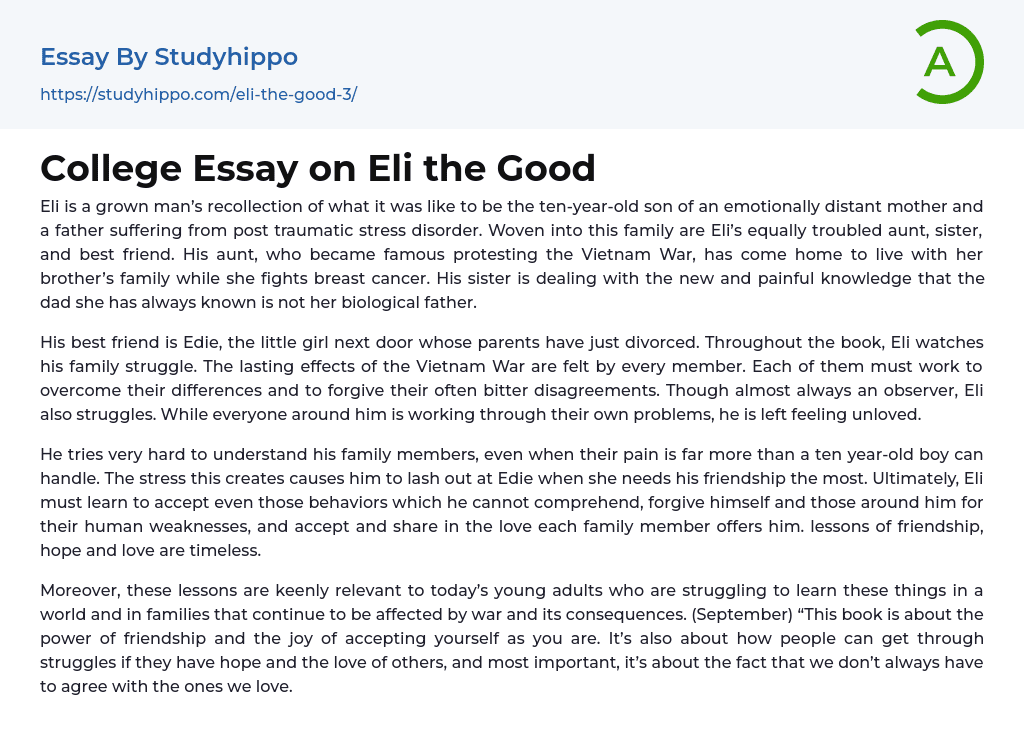Eli shares his childhood memories of having parents who were emotionally distant. His mother lacked emotional closeness, while his father struggled with post traumatic stress disorder. In addition to this family dynamic, Eli's aunt, sister, and best friend also faced their own challenges. His aunt, known for protesting against the Vietnam War, moved in with her brother's family as she fought breast cancer. Meanwhile, Eli's sister was dealing with the difficult realization that her father was not her biological parent.
Eli's closest companion is Edie, a young neighbor girl whose parents have recently divorced. In the book, Eli sees his own family struggling with the lasting effects of the Vietnam War. Each family member must work to resolve their differences and forgive each other for their frequent and bitter fights. While his relatives are actively involved,
...Eli mostly watches from the sidelines but still experiences personal difficulties of feeling ignored and unloved in the midst of all the chaos.
Despite being a ten-year-old boy, he makes a tremendous effort to understand and share the pain of his family members, even when it becomes overwhelming. This struggle affects him deeply, causing him to become defensive towards Edie at a time when she needs his support the most. Ultimately, Eli must accept that there are certain actions he may not fully comprehend, forgive himself and those around him for their imperfections, and embrace and reciprocate the love given by each member of his family. The story teaches timeless lessons about friendship, hope, and love.
Additionally, these lessons hold great significance for today's young adults who are encountering difficulties in learning these concepts in a world an
among families that are still impacted by war and its aftermath. (September) "This book explores the strength of companionship and the happiness that comes from embracing oneself as one truly is. It also portrays how individuals can overcome challenges with the presence of hope and the affection of others, and most importantly, it emphasizes that it is not necessary for us to always share the same beliefs as our loved ones.
- John Locke essays
- 9/11 essays
- A Good Teacher essays
- A Healthy Diet essays
- A Modest Proposal essays
- A&P essays
- Academic Achievement essays
- Achievement essays
- Achieving goals essays
- Admission essays
- Advantages And Disadvantages Of Internet essays
- Alcoholic drinks essays
- Ammonia essays
- Analytical essays
- Ancient Olympic Games essays
- APA essays
- Arabian Peninsula essays
- Argument essays
- Argumentative essays
- Art essays
- Atlantic Ocean essays
- Auto-ethnography essays
- Autobiography essays
- Ballad essays
- Batman essays
- Binge Eating essays
- Black Power Movement essays
- Blogger essays
- Body Mass Index essays
- Book I Want a Wife essays
- Boycott essays
- Breastfeeding essays
- Bulimia Nervosa essays
- Business essays
- Business Process essays
- Canterbury essays
- Carbonate essays
- Catalina de Erauso essays
- Cause and Effect essays
- Cesar Chavez essays
- Character Analysis essays
- Chemical Compound essays
- Chemical Element essays
- Chemical Substance essays
- Cherokee essays
- Cherry essays
- Childhood Obesity essays
- Chlorine essays
- Classification essays
- Cognitive Science essays




